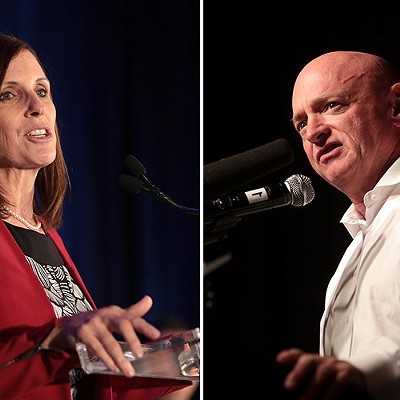White House mandates have forced the U.S. Forest Service to explore outsourcing numerous jobs, from campground cleanup to Web site maintenance. But many of those posts are filled by staffers also trained to fight fires. Losing this so-called "fire militia" could terribly impact the agency's already strained ranks, say critics. They compare it to the gutting of the Federal Emergency Management Agency, which subsequently floundered in New Orleans.
Mark Davis calls the zeal to privatize federal jobs--regardless of consequences--a Bush administration hallmark. "It's purely ideological," says the Forest Service chemist, who also serves on a legislative committee for the Forest Service Council, a union representing agency employees. "The Bush clan has completely bought into the idea of privatization."
Hank Kashdan won't argue with that. "It is part of the president's management agenda," says the Forest Service's deputy chief of business operations, from his office in Washington, D.C. "It has a very high profile within the administration."
Outsourcing could ultimately affect more than two-thirds of the Forest Service workforce, and replace more than 21,000 positions with private contractors. And that could cripple the agency's firefighting capacity, despite a congressional prohibition on cutting full-time federal firefighters.
Today, most teams conducting federal fire management are Forest Service or other Interior Department employees. And a huge percentage of them hold regular, federal day jobs.
For example, up to half of the Coronado National Forest's 200 employees play some fire-fighting role, from communications staff trained to provide timely fire information, to office administrators helping coordinate fire-season activities. "These are people who have other regular jobs, and who pitch in," says Coronado Supervisor Jeanine Derby. "There are a lot of roles for people other than the full-time (fire crews), from ordering supplies to setting up the camps.
"There's also very intense training involved," she says, "not only in how to carry out their jobs, but also in safety and communications and leadership."
The potential for a disaster has caught the attention of Congress, which recently questioned whether outsourcing takes into account the effectiveness of long-range firefighting, or is simply geared toward short-term savings. Recently, that congressional concern prompted a study by the U.S. Government Accountability Office.
But in the meantime, Davis claims his agency continues a dangerous, backdoor strategy to downsize fire staff. Forest Service officials "have their marching orders from the administration to outsource the world," he says. "And that's fine and dandy if they want to outsource making widgets. But if there's going to be an impact to the fire program, then Congress says, 'Don't do it.'"
Davis says that concern is blatantly ignored, even as Congress considers legislation protecting the fire militia. But Kashdan downplays congressional worries. "Keep in mind that (such a) law has not been enacted yet, and I don't know that it will be," he says. "The administration hasn't weighed in yet."
This wrangling occurs against a drought-ridden backdrop, which has sparked raging fires from Nevada to Nebraska. Over this past summer alone, some 7 million acres--the most in a decade--have been devastated by flames. In turn, that's only part of a larger trend: According to the U.S. Government Accountability Office, the acreage suffering from wildfires so far this decade has spiked 70 percent over the 1990s.
Given the ongoing crisis, it's "nutty" to shrink the federal firefighting force, says Casey Judd, business manager for the Idaho-based Federal Wildland Fire Service Association. But he calls the political battle lines clear-cut. "Obviously, there's a disagreement over the importance of firefighting as a collateral duty--between the folks who want to outsource everything and the folks who want to maintain a strong fire program."
He says outsourcing "collateral" fire duties could further stress the Forest Service's already overburdened fire staff. "The Forest Service has relied on those folks for years and years, despite the fact that the number of them has declined in recent years, primarily because of the lack of incentives."
This strain becomes painfully clear when fire season is bad, he says, and firefighting personnel gets spread thin. "What traditionally happens is that (the agency) then relies on contractors, which cost three to four times as much as federal firefighters. They rely on those folks and cost the taxpayers hundreds of millions of dollars each year more than they need to, by failing to take care of the infrastructure for their own employees."
At the same time, he cites Forest Service studies showing that outsourcing doesn't save any money in the first place. "So why are taxpayers paying for study after study, when the agencies themselves cannot prove that anything they've done saves money?
"Rather than properly compensating their own firefighters and strengthening the infrastructure of the nation's firefighting corps, they simply go out and spend the money on the higher-priced resources."
He cites the high cost of contractors "as the main reason why suppression costs are skyrocketing. You can get a five-man crew with an engine from the feds for $1,000 a day. The same thing from a contractor will cost you $5,000 a day."
According to the GAO, the federal government's cost to fight and suppress fires jumped to $3 billion in 2005, up from $1 billion in 1999.
There are also outsourcing disaster stories, such as in California, where fleet maintenance was contracted to a company called Serco Management Services. In that case, apparently to hide the truth, agency officials failed to provide data comparing in-house maintenance costs with what was being paid to Serco. And ultimately, the private contract was canceled due to Serco's repeated performance problems.
Such outcomes don't surprise Davis, who says that competitive outsourcing comes with a built-in paradox. "I'm a chemist," he says. "Now if you contract that out, I'm still going to get my salary. Maybe you can screw me out of benefits and save a little bit of money, but not much. And then the managers of the private corporations are going to get their big salaries, and the stockholders are going to get their (payoffs). And what is their incentive? Their incentive is to turn a buck."
But there's potentially an even greater cost to outsourcing, says the Coronado's Derby. "What you might lose is some of the motivation and strong identity with the agency. There's a real esprit de corps among the fire people. With any handoff for part of that work, that connection will be lost."












